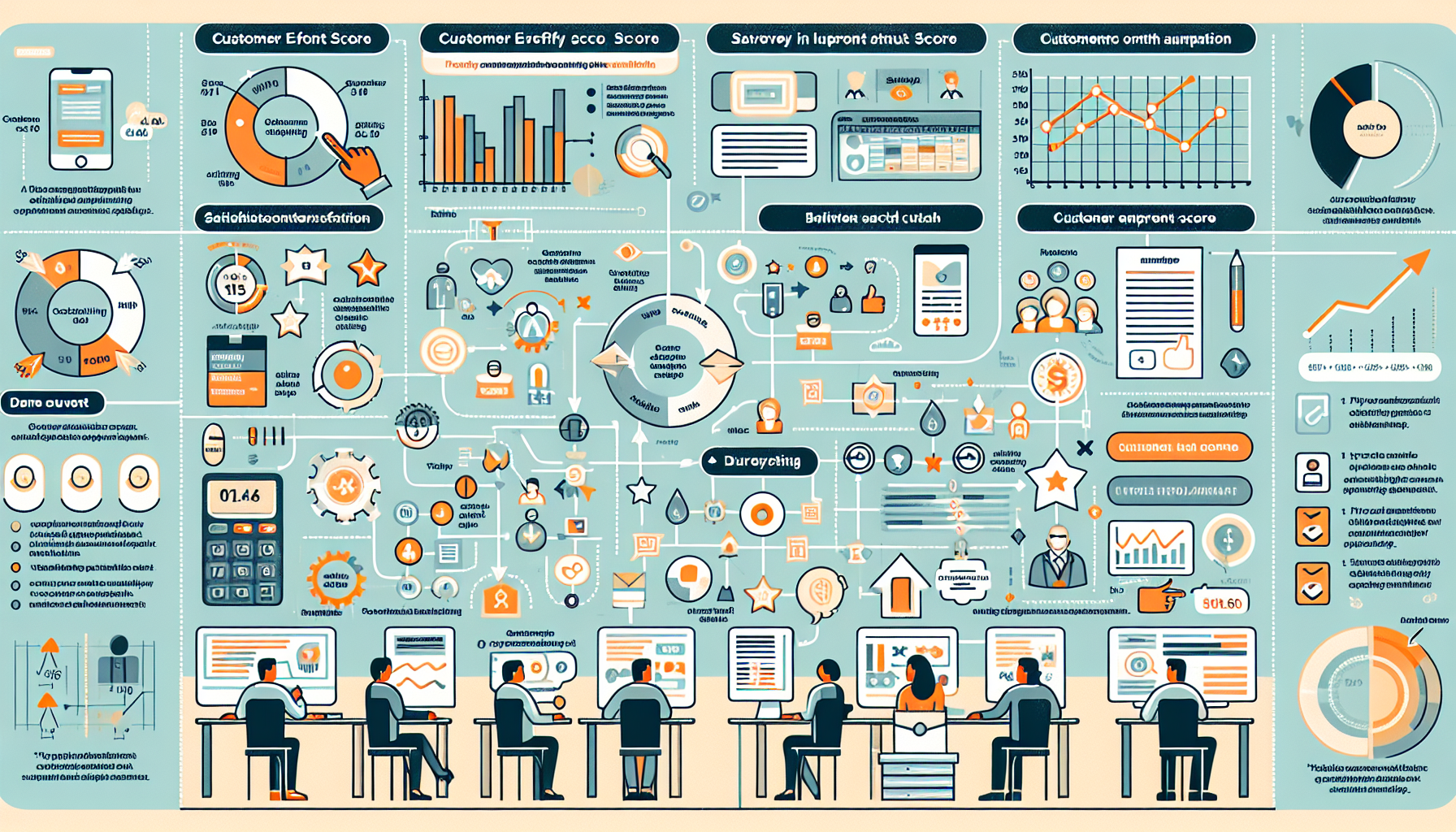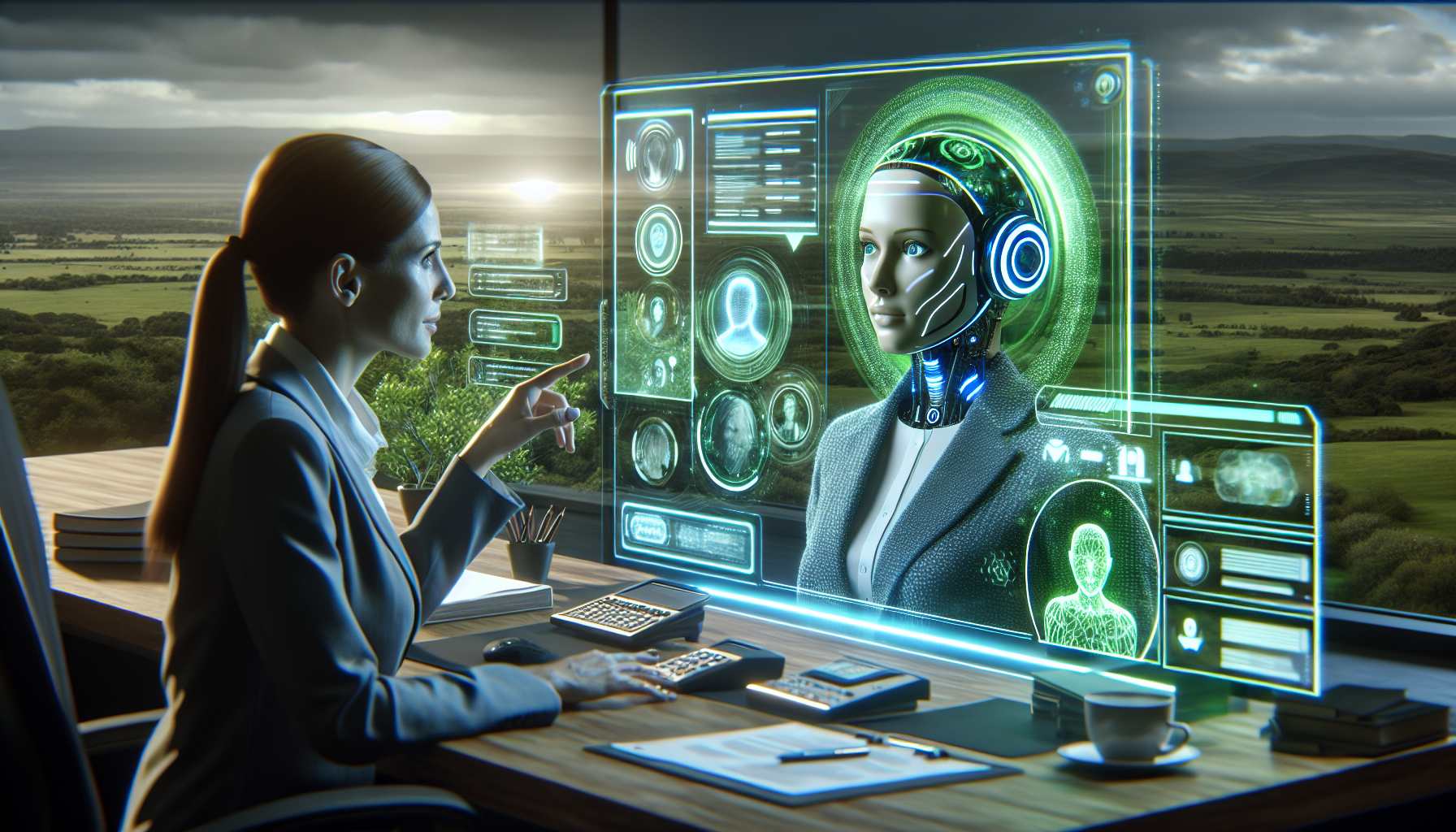
In today's competitive business world, understanding and efficiently addressing customer needs is an essential aspect of achieving and maintaining customer satisfaction. One of the key metrics in determining the efficiency and effectiveness of customer service is the Customer Effort Score (CES). This measures the amount of effort a customer has to put in to get issue resolution or to get their needs fulfilled by a business.
CES is typically measured on a scale where lower scores represent lower effort—a much-coveted scenario by businesses. CES is an excellent predictor of customer loyalty, making it a critical measure. With the advance of technology, businesses are continually seeking innovative methods to lower the CES. One such method is the advent of AI Receptionists.

Companies have begun to automate their reception desks with AI, capable of performing various tasks, including answering customer inquiries, booking appointments, and routing calls. These AI Receptionists are designed to be highly efficient and intuitive, ensuring minimal effort from the customer's end. The emergence of AI receptionists has significantly impacted the CES, drastically reducing customer effort and promoting customer loyalty.
In the following sections, we will delve deeper into how AI Receptionists have impacted the Customer Effort Score, consequently improving customer service efficiency and effectiveness.
Often hailed as the future of customer service, AI Receptionists are automated systems powered by Artificial Intelligence that assist businesses in managing their front-of-house operations. Just like human receptionists, they are the first point of contact for visitors, answering queries, taking messages, and routing calls. However, where they move beyond their human counterparts' capabilities is in their 24/7 availability, advanced language processing abilities, and seamless integration with business tools.
24/7 availability is a distinctive feature of AI receptionists. Unlike human staff members, AI doesn’t sleep, doesn’t need breaks, and doesn’t call in sick. AI receptionists ensure that businesses can provide instantaneous customer support round the clock, improving the customer's experience tremendously. This always-available customer support can play a significant role in decreasing the Customer Effort Score (CES).
The second distinct feature is the language processing ability of AI receptionists. Powered by natural language processing (NLP), AI receptionists are more than capable of understanding, interpreting, and responding to spoken or written requests in various languages. NLP takes into account context, sentiment and other subtleties of human language, making AI receptionists capable of delivering personalized, intelligent responses. This helps in reducing customer effort, as language barriers or misunderstandings are eliminated.
Furthermore, AI receptionists integrate seamlessly with various business tools, such as CRM (Customer Relationship Management), Task Management, and Communication tools. For example, when a customer communicates with the AI receptionist, it can pull up all the customer's details available in the CRM system, offering a highly personalized interaction. The interaction details can be logged into the CRM or sent to a communication platform for further follow-up. This level of automation reduces the customer's effort to repeat their problem or wait for the human agent to manually note down their issue.
In conclusion, the role of AI Receptionists goes beyond meeting and greeting in an office environment. Their 24/7 availability, advanced language processing abilities, and integration with business tools help in reducing the CES, thereby offering an enhanced customer experience.
As more businesses embrace the power of artificial intelligence (AI), customers can anticipate a significant reduction in the effort needed to conduct transactions or resolve issues. AI receptionists are at the forefront of this trend, serving as digital assistants that efficiently facilitate occurrence of basic tasks such as scheduling, data retrieval, and issue resolution.

In the realm of scheduling, AI receptionists are programmed to manage calendars effectively. They offer real-time visibility into a company’s availability, ensuring that customers can conveniently book appointments that work best for them. This abolishes the need for customers to spend precious time waiting on the phone or sending emails, thereby decreasing customer effort substantially. An example of this is the GigaBook's online booking software, which allows businesses to automate their booking process.
When it comes to data retrieval, an AI receptionist can fetch information at remarkable speeds, providing customers with immediate access to necessary data and details. To illustrate, the Clara scheduling service utilises AI to process emails, ensuring quick retrieval of important data like meeting times and attendee names, hence, considerably reducing customer effort.
On issue resolution, AI receptionists are designed to resolve common customer issues without human intervention. This feature leads to fast and efficient issue resolution, which dramatically reduces the work required from the customer’s end. A good example would be IBM's Watson Assistant, an AI tool that can understand and respond to customer’s queries in a way that is conversant and helpful.
Therefore, AI receptionists are bound to have a positive impact on a company's Customer Effort Score (CES). By utilizing these digital assistants, businesses not only offer superior customer service but also make their services more accessible, convenient, and time-efficient.
In the ever-evolving digital landscape, numerous businesses are proactively seeking ways to digitize and automate their customer service channels to increase efficiency, cost-effectiveness, and the overall customer experience. Here, we present a few intriguing case studies of firms that have successfully integrated AI Receptionists into their working systems, resulting in significant improvements in their Customer Effort Score (CES).
In 2020, Royal Bank of Canada (RBC) deployed an advanced AI receptionist called NOMI. The goal was to simplify the customer experience by effectively attending to queries and offering solutions in real-time. The implementation of NOMI resulted in a marked decrease in grievance calls and query forwarding, elevating their CES and overall customer satisfaction.
Another successful example is the Garena (SEA Ltd.) case study. They implemented an AI receptionist to attend to their massive millions-strong user base. The deployment of AI significantly reduced customer effort, as indicated by the decrease in instances where users had to repeat their queries or requests. This initiative increased their CES rating, equating to more satisfied customers.
Shopify, a leading E-commerce platform, also harnessed the power of AI receptionists. They created an AI platform named Kit to engage with online shoppers and help store owners manage their tasks. By addressing the customers' concerns more seamlessly, Kit improved Shopify's overall CES.
The verdict is clear: AI Receptionists significantly reduce customer effort, thereby improving the CES. They cater efficiently to user queries and reduce the need for customer contact, greatly increasing customer satisfaction. Companies that are willing to embrace these technologies can enjoy the numerous perks that come with a reduced customer effort score.
In the growing era of digitalization, the application of Artificial Intelligence (AI) has become increasingly prevalent in many industries, with AI receptionists being one such application. Although AI receptionists have proven to be highly effective in reducing Customer Effort Score (CES), their implementation is not without challenges. This section aims to shed light on potential issues that businesses may face, from integration complexities to customer adaptation.

One of the significant hurdles in implementing AI receptionists is the complexity of integration with existing infrastructure. Businesses often face the daunting task of upgrading their current systems to accommodate AI technology. Additionally, the sophistication of AI adds an extra layer of complexity, requiring time, resources, and technical expertise to ensure seamless integration.
Aside from integration complexities, another challenge can be customer adaptation. Some customers may have reservations about interacting with AI, especially if they're used to human receptionists. Change can be daunting, and it's crucial for businesses to educate their customers about AI receptionists and the benefits they bring, such as increased efficiency and decreased waiting times, to ease adaptation.
It's vital for businesses to remember that the goal of implementing AI receptionists should be to reduce customer effort, not increase it. With comprehensive planning and open communication, these challenges can be successfully navigated, leading to an improved CES and overall enhanced customer experience.
In conclusion, the advent of AI receptionists has introduced a revolutionary shift in how businesses enhance their Customer Effort Score (CES). The AI-powered assistants have been instrumental in reducing customers' effort to get their problems resolved, significantly improving satisfaction and loyalty. By providing round-the-clock support, promptly addressing queries, integrating multi-channel support, and minimizing wait times, these intelligent machines are effectively enhancing CES indices across various sectors.
AI's versatility in handling different tasks concurrently without compromising quality or speed supports businesses in their effort to meet customer needs expediently. It has also simplified tasks that require in-depth knowledge and speed, which would be detrimental to human capabilities under sheer workload pressure. By providing equally competitive, if not better, customer experiences as human receptionists, it is evident that AI receptionists are yielding significant benefits in boosting CES.
As we look towards the future, AI's customer service role is poised to grow ever more sophisticated and efficient. With continuous advancements in machine learning and natural language processing, AI receptionists will continue to evolve, becoming even more adept at understanding human speech, interpreting client queries, and providing immediate and accurate responses. We can expect more personalized interactions in the future, as improved AI algorithms will facilitate a far more dynamic understanding and adaptation to individual customer needs. This could lead to further improvement in CES.
This is, however, only the tip of the iceberg. The integration of emergent technologies like blockchain and Internet of Things (IoT) with AI receptionists could pave the way for a hyper-connected, intuitive customer service ecosystem. Moreover, the potential of using virtual reality (VR) to provide immersive, interactive customer experiences opens up exciting possibilities for the future of customer service and CES improvement.
Thus, the emergence of AI receptionists is not just transmuting customer service landscapes today, but it also promises an even more transformative and customer-centric future.
Start your free trial for My AI Front Desk today, it takes minutes to setup!








